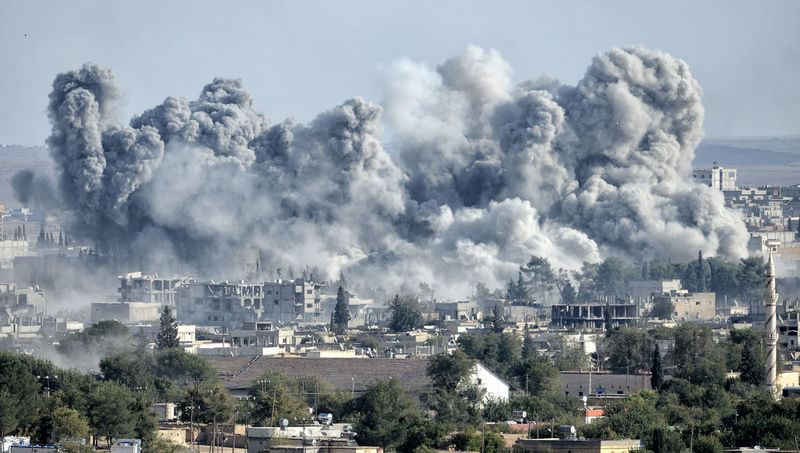What Do You Do When You Hear The Call To Jihad

Political turmoil, civil unrest, sectarian war, among others, are not uncommon in the Muslim world, specifically in the Middle East. When tension runs high and armed conflict seems inevitable, the notion of jihad will resurface. Global Muslims, by virtue of their shared tawheedic faith, are at the receiving end to the persuasion to partake in the conflict.
Many, as evident in the present Syrian civil war, would fall into the trap, believing that participation in such military operations is a manifestation of true faith. They feel obliged to respond to the call for jihad. The big question, however, does every fight that involves Muslims and a Muslim land fit the framework of jihad? Is there a possibility that we are witnessing Qital al-Fitnah?
What is Qital al-Fitnah?
Qital is Arabic for “fight, combat, strife, battle.” Fitnah is also Arabic and carries the meaning of “temptation, trial, discord, civil strife.” When the two are combined, it refers to a battle where Muslims are fighting each other for unclear reasons and when truth and falsehood are beyond recognition. Prophet Muhammad s.a.w. was reported to have foretold the occurrence of Qital al-Fitnah although it was never termed as such.
"The world would not come to an end until a day would come to the people on which the murderer would not know as to why he has killed and the slain would not know why he has been murdered.
It would be said: Why would it happen? To which he replied: It would be because of general massacre and bloodshed. And the slaughterers and the slain would be in Fire.”
(Narrated by Imam Muslim)
His words pointed at war among Muslims where truth and falsehood become uncertain. Traditional Sunni scholars debated over the underlying message of the hadith and the type of war it represents. There is no consensus among contemporary Muslim scholars to classify the Syrian Civil War, for example, as Qital al-Fitnah. However, a conflict that eventually morphs into a multi-pronged, multi-cornered war fits the description well.

Another characteristic of Qital al-Fitnah is when transgression prevails over the act of defence. This explains the Battle of the Trench (Khandaq) during the time of the Prophet s.a.w. The war was a response to security threat inflicted by the enemies from Makkah to the newly-formed Muslim community in Madinah. A war that neglects this aspect is, therefore, illegitimate.
Islam also dictates that only the Ulu al-amr (legitimate Muslim authority) may declare war. In today's setting, this refers to the recognised local authority. Traditional Sunni scholars such as Imam Al-Mawardi held that a Muslim leader is to manage the affairs of this world, which includes the call for a military operation. Members of the public, including non-qualified mufti and imam, do not possess the privilege to exercise such decision-making capacity. Otherwise, his action is unlawful in the sight of both Islamic and civil law.
What is the proper response when dealing with Qital al-Fitnah?
Let us ponder upon the following prophetic guidance, where Rasulullah s.a.w. mentioned:
"Verily there will be (fitan) tribulations, then there will be tribulations during that one who is sitting will be better than one who is walking, and one who is walking is better than one who is running. During those tribulations, whoever has camels, let him stay with his camels, whoever has sheep, let him stay with his sheep, and whoever has land, let him stay on his land.”
A man said: “O Messenger of Allah, what do you think if he does not have camels, or sheep, or land?” He said: “Let him go to his sword and make it blunt with a stone, then let him try to find a way of escape if he can.
Oh Allah, have I conveyed (the message)? O Allah, have I conveyed (the message)? O Allah, have I conveyed (the message)?" A man said: “O Messenger of Allah, what if I am forced to join one of the two ranks, or one of the two groups, and a man strikes me with his sword, or an arrow comes and kills me?” He said: “He will bear the burden of his sin and your sin, and he will be one of the people of the Fire.”
(Hadith narrated by Imam Muslim)
There are three takeaways here:
First is to mind one’s own business. This is the underlying message when the Prophet s.a.w. directed one to stay by their flocks/asset.
Second, is to refrain from engaging in violence or fighting. Instead, one should lay down their weapons and head to a less hostile environment.
Third, the hadith spoke about the civil war. The murderer will be thrown to the Hellfire and bear the sins of those he killed. Those who cannot avoid the conflict for whatever reason it may be, and become a casualty while defending himself will not be liable for the transgression created by others.

Civil conflict and war could break in any Muslim-ruled country such as Syria. If it happens, a second look at the cause(s) of war such as internal strife, foreign interference, geopolitics, among others, is essential before framing the occurrence as a call of jihad. It has to be viewed beyond religious standpoint.
When the line of truth and false gets blurred, the wiser choice is to distance oneself and refrain from getting involved in. The presumed battlefield of jihad that offers martyrdom and afterlife reward is actually a theatre of Qital al-Fitnah.

